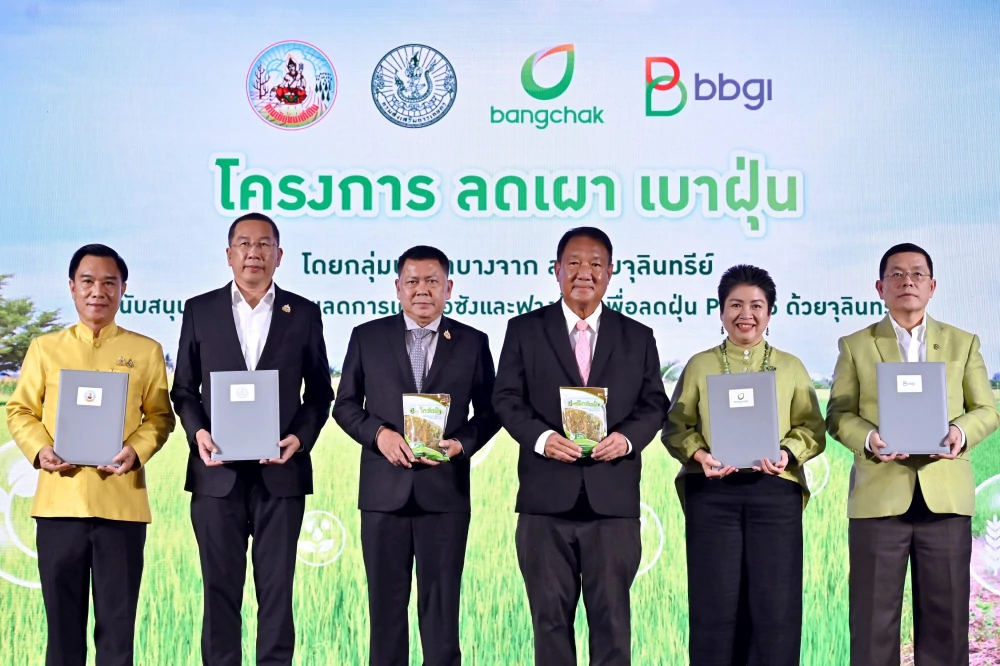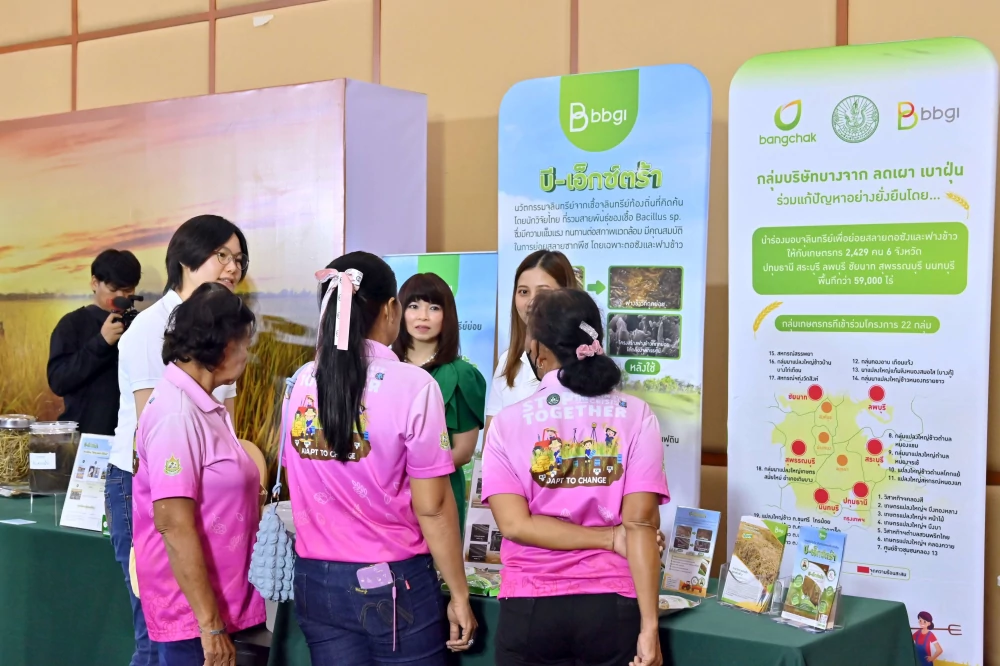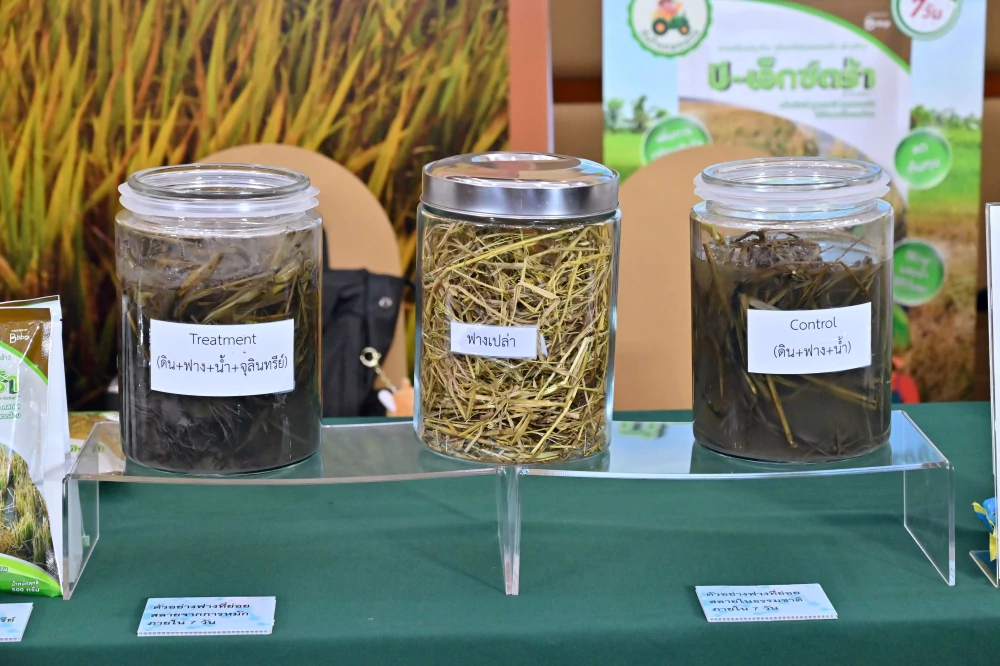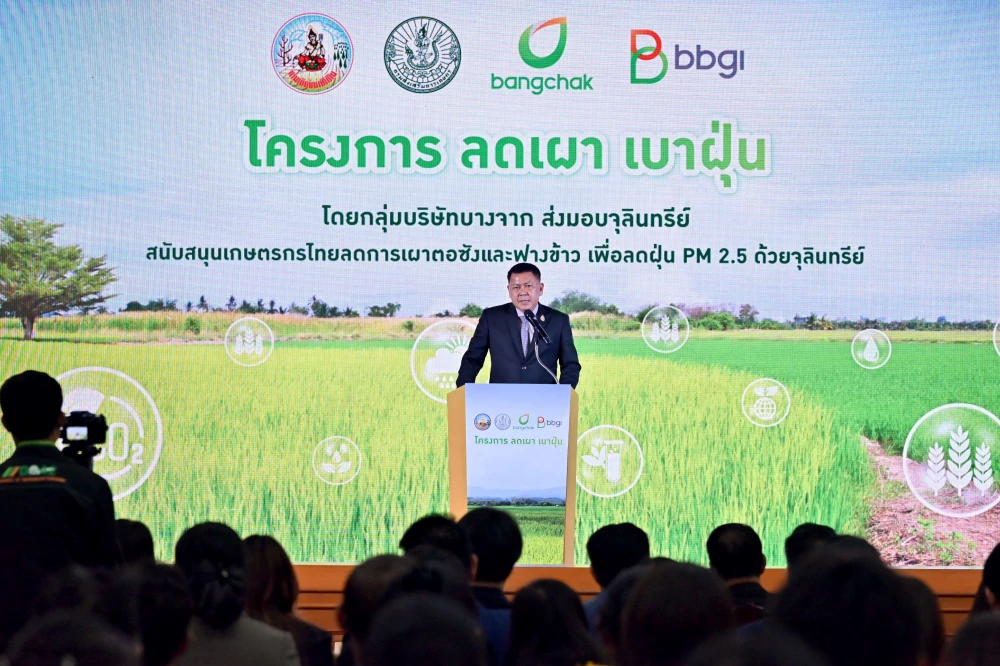18 October 2024
Ministry of Agriculture Supports "Burn Less, Breathe Clean" by Bangchak and BBGI Helping Thai Farmers Reduce Rice Straw Burning to Cut PM 2.5 with Microbial Technology

Mr. Prayoon Inskul, Permanent Secretary of the Ministry of Agriculture and Cooperatives, presided over the signing ceremony of the Memorandum of Understanding (MOU) for the "Reducing Burns, Easing Dust" project. The MOU was signed between Bangchak Corporation Public Company Limited and BBGI Public Company Limited in collaboration with the Department of Agricultural Extension and the Land Development Department to support the reduction of agricultural burning by using microbial technology to decompose rice straw and stubble. The project aims to help farmers reduce PM 2.5 dust and lower carbon emissions caused by burning in agricultural areas. Signatories included Mrs. Gloyta Nathalang, Senior Executive Vice President, Sustainability Management and Corporate Communications, Bangchak Corporation Public Company Limited, Mr. Kittiphong Limsuwannarot, Chief Executive Officer and President, BBGI Public Company Limited, Mr. Peeraphan Korthong, Director-General of the Department of Agricultural Extension, and Mr. Arthit Sukhkasem from the Land Development Department. Additionally, Mr. Kittiratt Na-Ranong, the initiator of the microbial decomposition concept, was an honorary witness.
Mrs. Gloyta Nathalang, Senior Executive Vice President, Sustainability Management and Corporate Communications, Bangchak Corporation Public Company Limited, said, “Bangchak is pleased to support farmers by providing environmentally friendly innovations. Together with BBGI, an affiliate of Bangchak, we have developed efficient microbial technology that decomposes rice straw in just seven days, reducing the need for burning while also rejuvenating soil quality. In addition to reducing PM 2.5, this innovation enhances soil fertility in the long term. This agreement is part of Bangchak’s commitment to creating a low-carbon society, encouraging Thai farmers to shift to eco-friendly agricultural practices and contributing positively to reducing air pollution and addressing climate change.”
Mr. Kittipong Limsuwanroj, CEO and President of BBGI Public Company Limited, added, “BBGI is proud to play a part in developing this microbial technology for rice straw decomposition. Our research collaboration with partners has led to a product that is easy to use and highly effective. It not only helps reduce the need for burning but also promotes sustainable agriculture by reducing greenhouse gas emissions and providing long-term benefits to the agricultural sector. This aligns with BBGI’s vision of leading biotechnology development to address environmental challenges and supporting the growth of the agricultural sector in a rapidly changing climate.”
Mr. Peeraphan Korthong, Director-General of the Department of Agricultural Extension, stated, “Changing farmers’ behavior to reduce burning requires technology and farmers to see real results from testing, which is one way to integrate the drive to solve the PM 2.5 issue in the agricultural sector. Cooperation between the government, private, and public sectors is required to create clean air, restore, and preserve the environment together. Initial testing in both laboratories and farmers’ fields shows that the microbes can decompose rice stubble and straw within seven days. The application method is simple and accepted among farmers. This has led to behavior changes, with farmers refraining from burning and expressing high satisfaction. Going forward, we plan to support more farmers in six provinces surrounding Bangkok.”
Mr. Prayoon Inskul, Permanent Secretary of the Ministry of Agriculture and Cooperatives, praised the cooperation among all parties involved in the project, saying, “The Ministry of Agriculture and Cooperatives is committed to improving the quality of life for Thai farmers by promoting environmentally friendly agricultural practices as an alternative to burning. Following the Ministry’s 3R Model, the R1: Re-Habit approach focuses on changing farmers’ behavior to cultivate without burning, while managing agricultural waste in a way that adds economic value and benefits the soil. The use of microbial technology for rice straw decomposition in this project is a significant step toward sustainable burning reduction. I am confident that today’s agreement will lead to integrated efforts from all agencies involved to prevent and solve the PM 2.5 issue in agriculture, ensuring better quality of life and a healthier environment for future generations.”
The " Burn Less, Breathe Clean " project kicks off in October 2024, covering an initial area of 59,000 rai in six provinces surrounding Bangkok: Pathum Thani, Nonthaburi, Saraburi, Lopburi, Chainat, and Suphanburi. The goal is to enable farmers to adopt environmentally sustainable agricultural practices on a long-term basis.





